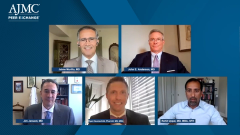
Economic Burden Associated with HF-Related Comorbid Disease
Panelists discuss treatment for heart failure in the presence of comorbid disease impacting payer considerations.
Episodes in this series

Ryan Haumschild, PharmD, MS, MBA: Dr Murillo, I have a couple questions for you. I’ll ask them and get your take. How do you see the management and treatment of heart failure? How is it a priority for payers across the country? What are some of the key drivers of cost? Is it hospitalizations of these patients? Is it increased health care resource utilization? How is this affected when patients have comorbidities or metabolic disease? Lastly, how does this economic burden challenge the disease? I asked you a lot of questions, but as a whole, how does heart failure play in to payer-directed decision-making? What are some of the key considerations that you think about?
Jaime Murillo, MD: If our mission is to help people live healthier lives, then heart failure becomes a priority for everyone—not just the payers. It’s the clinicians, caregivers, employers, hospital systems, health systems, and so on. Why is it important? Because we know heart failure is for the most part chronic. There are certain conditions that will reverse completely. But let’s assume for the most part it’s chronic and debilitating. As Dr Januzzi mentioned, it affects quality of life and leads to hospitalizations, hospital readmissions, and increased mortality. And of course, if there are more hospitalizations, then heart failure costs and total costs of care go up as well. There are many reasons.
The other part that’s important to mention about heart failure is the fact that those patients have comorbidities associated with that. For instance, when we do our health economic outcomes analysis, we can separate the costs related to heart failure. We can also look at the costs associated with patients with heart failure who have comorbidities, and you’d be surprised at how high the burden is. Those patients tend to have a lot of comorbidities. That’s another reason it’s such a high priority. It isn’t surprising that treating those patients leads to a lot of worsening conditions over time if we don’t pay attention to it.
One of the things that I like about those guidelines is the fact that they’re putting more emphasis on who’s at risk and who has pre-heart failure, because that will allow us to go upstream. Because at the end of the day, we shouldn’t become experts in treating heart failure. We need to, but people will be better served if we become experts on how to prevent heart failure. That’s the beauty of where the health care transformation is going. That’s the direction, and we can talk more about it later. But that effort will ultimately pay off.
Ryan Haumschild, PharmD, MS, MBA: Prevention is such an understatement. You’re right, how can you attack disease? How can you provide patient support that…gives them a better chance of event-free survival but at the same time controls disease so it doesn’t keep progressing? That’s so important. I like your comment about how comorbid disease creates economic burden. I agree with you, a lot of our patients with heart failure present with comorbid disease. How do they maintain adherence and proportionate days covered when they’re taking multiple regimens? Great points there from a metabolic syndrome and heart failure perspective.
Transcript edited for clarity.
Newsletter
Stay ahead of policy, cost, and value—subscribe to AJMC for expert insights at the intersection of clinical care and health economics.










